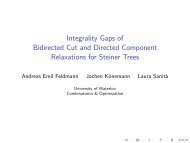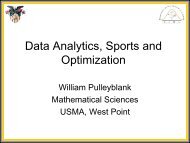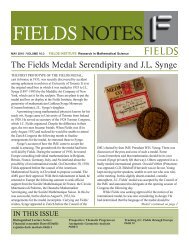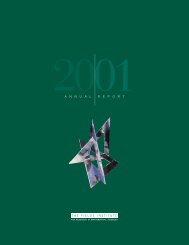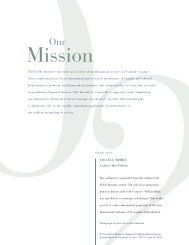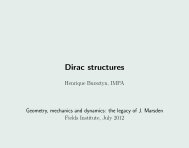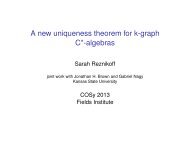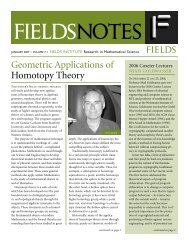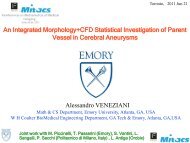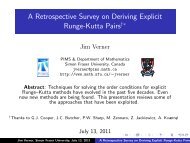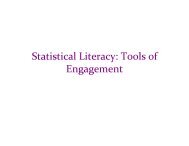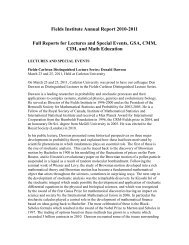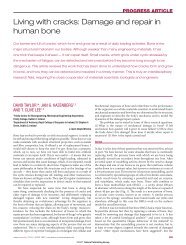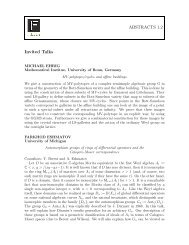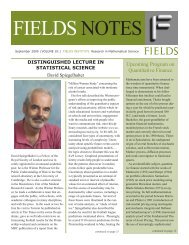Annual Report 2005 - Fields Institute - University of Toronto
Annual Report 2005 - Fields Institute - University of Toronto
Annual Report 2005 - Fields Institute - University of Toronto
Create successful ePaper yourself
Turn your PDF publications into a flip-book with our unique Google optimized e-Paper software.
<strong>University</strong>) presented recent results on the use <strong>of</strong> DNA molecules<br />
to govern generalized output processes. Eric Klavins<br />
(<strong>University</strong> <strong>of</strong> Washington) spoke on robotic self-organization.<br />
There were twenty three 25-minute oral presentations<br />
<strong>of</strong> research contributions, where the last minutes <strong>of</strong> each<br />
talk were devoted to an active time for questions and<br />
comments. Also, a poster session was held where forty five<br />
posters were presented.<br />
With Len Adleman (the founder <strong>of</strong> the field <strong>of</strong> DNA<br />
Computing) in attendance, and with an impressive array <strong>of</strong><br />
talks combining theoretical aspects with the latest achievements<br />
in nanotechnology, DNA11 has been a successful and<br />
inspiring meeting.<br />
The <strong>Fields</strong> <strong>Institute</strong> was the lead sponsor for the conference.<br />
In addition, the conference was supported by MITACS,<br />
BIOMAR Inc. and the <strong>University</strong> <strong>of</strong> Western Ontario.<br />
Plenary Speakers:<br />
Eshel Ben-Jacob (Tel Aviv)<br />
Bacterial intelligence and DNA computing<br />
James Gimzewski (UCLA)<br />
Nanomechanical probes <strong>of</strong> biosystems<br />
Pehr Harbury (Stanford)<br />
Translating DNA words into actions<br />
Eric Klavins (Washington)<br />
Robotic self-organization<br />
Dipankar Sen (Simon Fraser)<br />
DNA as the raw material for general-purpose electrical biosensors<br />
Summer School in Operator Algebras<br />
33 rd Canadian Operator Symposium (CoSy)<br />
June 7-17, <strong>2005</strong> and June 19-24, <strong>2005</strong><br />
Held at the <strong>University</strong> <strong>of</strong> Ottawa<br />
Organizing committee: Thierry Giordano (Ottawa), David<br />
Handelman (Ottawa), Jamie Mingo (Queen’s), Matthias<br />
Neufang (Carleton) and Vladimir Pestov (Ottawa)<br />
Advisory Committee: George Elliott (<strong>Toronto</strong>), Ken Davidson<br />
(Waterloo), Nigel Higson (Penn State), Ian Putnam<br />
(Victoria) and Roland Speicher (Queen’s)<br />
The <strong>University</strong> <strong>of</strong> Ottawa hosted a pair <strong>of</strong> linked events in<br />
June, starting with a two-week summer school in Operator<br />
G e n e r a l S c i e n t i f i c A c t i v i t i e s<br />
Algebras, and concluding with the 33 rd Canadian Operator<br />
Symposium (CoSy). The symposium was dedicated to<br />
George Elliott, on the occasion <strong>of</strong> his 60 th birthday. George<br />
is one <strong>of</strong> Canada’s leading mathematicians, and a driving<br />
force behind operator algebras in Canada. Both events were<br />
sponsored by the <strong>Fields</strong> <strong>Institute</strong>.<br />
Additional funding was supplied by a NSERC Leadership<br />
Support Initiative grant, held by J. Mingo, M. Neufang, A.<br />
Nica, and R. Speicher and by a grant from the US National<br />
Science Foundation to support US participants at the summer<br />
school and CoSy.<br />
The summer school was a great success. Over 75 mathematicians<br />
have participated in at least one week <strong>of</strong> the<br />
summer school, nearly 60 <strong>of</strong> which number have attended<br />
both weeks. The participants came from Canada, the US<br />
and many European countries. The success <strong>of</strong> the summer<br />
school is largely due to the exceptional quality <strong>of</strong> the lecturers,<br />
who each delivered a series <strong>of</strong> 5 ninety minute lectures.<br />
First week lectures were:<br />
Roger Smith (Texas A&M)<br />
An introduction to the theory <strong>of</strong> operator spaces<br />
Roland Speicher (Queen’s)<br />
Free probability theory<br />
Stefaan Vaes (Paris VI)<br />
Type III factors in non-commutative probability theory<br />
Second week lectures were:<br />
Nigel Higson (Penn State)<br />
An introduction to noncommutative geometry<br />
Ian Putnam (Victoria)<br />
C*-algebras and dynamical systems<br />
Mikael Rørdam (U. Southern Denmark)<br />
Amenable C*-algebras and their classification<br />
Moreover, additional specialized talks were presented, in<br />
particular by Marius Junge (Illinois at Urbana-Champaign)<br />
on Probabilistic techniques in operator spaces.<br />
The summer school prepared students to get the most out<br />
<strong>of</strong> the advanced talks given at the symposium. CoSy itself<br />
represented a chance to assemble a large and active group <strong>of</strong><br />
operator researchers. During the banquet held in the honour<br />
<strong>of</strong> George Elliott, many colleagues, friends and former<br />
students <strong>of</strong> George emphasized not only the importance<br />
<strong>of</strong> his mathematical contributions and achievements, but<br />
<strong>Fields</strong> <strong>Institute</strong> <strong>2005</strong> ANNUAL REPORT 85



